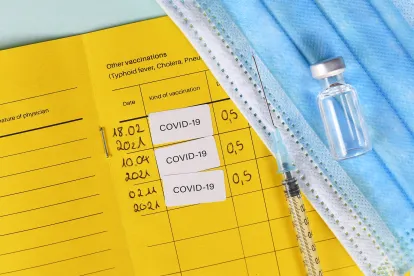More than seven months ago, on September 9, 2021, President Biden issued Executive Order 14042, which imposed a COVID-19 vaccine mandate on many federal contractors and subcontractors. As we have previously reported, the order intended to use the federal government’s contracting power to increase the number of vaccinated people. Since then, 26 states have filed seven federal court cases that have resulted in six injunctions, one of which was nationwide. The United States now has appealed all six injunctions. Recently, the Eleventh Circuit was the first appellate court to hear oral argument in the Georgia case, the most significant of all the cases, because that is the one with the nationwide injunction.
Background
The order was one of several attempts by the government to push vaccines out broadly to the public. It directed federal agencies to begin amending solicitations and contracts to include a COVID-19 vaccination requirement for federal contractors and subcontractors. The order applies broadly to services, construction, leasehold interest, or concessions contracts performed in the U.S. and its outlying areas, and generally valued above $250,000.
The order, however, was challenged very soon after it was issued. A variety of private individuals and organizations filed suit, but the cases that have gotten the most traction were those filed by the attorneys general of 26 states who, in different coalitions, filed suits in the Eastern District of Kentucky, the Southern District of Georgia, the Eastern District of Missouri, the Western District of Louisiana, the Middle District of Florida, the Southern District of Texas, and the District of Arizona. The states filed these cases at the end of October and at the start of November 2021.
While arguing a variety of legal theories, the one argument common to all the state cases has been that the president exceeded his authority under the Federal Property and Administrative Services Act (Procurement Act), 40 U.S.C. § 101 et seq., when he issued the order. The Procurement Act has as its purpose the provision to the federal government of an economical and efficient system for procuring and supplying property and nonpersonal services. The argument has been successful.
-
On November 30, 2021, in Kentucky v. Biden, the U.S. District Court for the Eastern District of Kentucky enjoined enforcement of the vaccine mandate in Kentucky, Ohio, and Tennessee, which are the state plaintiffs. The U.S. has appealed to the Fifth Circuit.
-
On December 7, 2021, in Georgia v. Biden, the U.S. District Court for the Southern District of Georgia enjoined enforcement of the vaccine mandate nationwide. The state plaintiffs here are Alabama, Georgia, Idaho, Kansas, South Carolina, Utah, and West Virginia. The U.S. has appealed to the Eleventh Circuit, which recently heard oral argument, the first court to do so.
-
On December 16, 2021, in Louisiana v. Biden, the U.S. District Court for the Western District of Louisiana enjoined enforcement of the order in contracts between the states of Indiana, Louisiana, or Mississippi, the state plaintiffs, or their agencies, and the federal government. The U.S. has appealed to the Fifth Circuit.
-
On December 20, 2021, in Missouri v. Biden, the U.S. District Court for the Eastern District of Missouri enjoined enforcement of the order in Missouri, Nebraska, Alaska, Arkansas, Iowa, Montana, New Hampshire, North Dakota, South Dakota, and Wyoming, which are the state plaintiffs. The U.S. has appealed to the Eighth Circuit.
-
On December 22, 2021, in Florida v. Nelson—for some reason, Florida listed the current NASA Administrator, who is a former Florida politician, first among the named defendants—the U.S. District Court for the Middle District of Florida enjoined enforcement of the Order in Florida, the only state plaintiff. The United States has appealed to the Eleventh Circuit.
-
On January 27, 2022, in Brnovich v. Biden, the U.S. District Court for the District of Arizona enjoined enforcement of the order in Arizona, the only state plaintiff, by federal agencies. The U.S. has appealed to the Ninth Circuit.
-
The case in Texas is an exception procedurally. In Texas v. Biden, the U.S. District Court for the Southern District of Texas stayed proceedings in a status conference that took place on December 10, 2021, three days after the Georgia court issued the nationwide injunction. Texas was the only state plaintiff in that case.
The Georgia appeal is the most developed procedurally, with oral argument having taken place on April 8, 2022, before an Eleventh Circuit panel comprised of Circuit Judges R. Lanier Anderson III, J.L. Edmondson, and Britt C. Grant. The government argued that there is a close nexus between the order and the Procurement Act’s goals of economy and efficiency in federal contracting, making the order lawful. The government also challenged the nationwide scope of the injunction as overly broad. There was active questioning from the bench about the order’s permissibility, given prior Executive Orders involving non-discrimination policies. There were also the questions of whether, in a close case, the injunction constituted an abuse of discretion and whether the injunction was properly issued nationwide.
What is the takeaway?
Even if the government is successful at the Eleventh Circuit, it would then have to succeed individually on each of the other cases to reinstate its national COVID-19 vaccine policy, given the other injunctions. In light of what appears to be a decision by the Department of Justice to challenge adverse decisions across the board and the intensity of political feeling on the issue nationally, whatever the outcome at the Eleventh Circuit, it is likely that the validity of the order will finally be decided at the Supreme Court. The irony is that, whenever that happens, perhaps next year, the virus the order was meant to combat may well — and hopefully will — have disappeared as a serious national public health issue.





 />i
/>i

